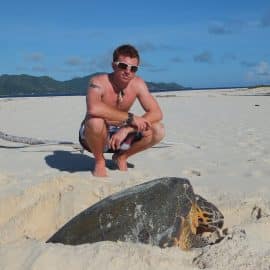Biology
Our aim is to prepare independent thinkers who can comprehend, and perhaps contribute to the future of, the fast-developing body of knowledge and understanding that constitutes modern Biology.
Biology is everywhere; it is a fascinating subject that everyone can relate to at some level. We expand boys’ horizons, introducing them to the complexity of human and plant biology. They learn about the ever-evolving changes in the world around us in both the animal and plant kingdoms, all the way from the cellular to the systems level.
Biology is a practical subject, and through emphasis on experimental work, we hope to inspire boys to explore all aspects of the living world. We teach them the curriculum in depth, always insisting on excellence in their work, and provide an environment in which they can feel confident to question the science presented to them.
We aim to instil critical and analytical skills related to biology throughout the GCSE and A-level courses. By exposing pupils to cutting-edge thinking by leading biologists in external lectures, in scientific articles and through peer presentations, we help them as they begin to build up a bigger picture of Biology.
Competitions such as the Biology Challenge and Olympiad enable pupils to explore topics beyond the limitations of the curriculum.
The department makes extensive use of modern communication technologies to enhance pupils’ learning: seeing an endoscope video clip of food being swallowed typically has far more impact than reading about the process in a book. Access to the internet in laboratories also enables us to immediately correct misconceptions or to explore new ideas that emerge during lessons.
Old Elizabethans: Young medic wins awards
In his final year at QE, Joseph Masters was one of the first-ever recipients of a new prize sponsored by Queen’s College, Oxford – the Sciences prize for his Extended Project Qualification on the quest for a malaria vaccine.
Joseph (OE 2004-2011) then amassed an impressive collection of accolades during his medical studies at ‘Barts and The London’, including The John Abernethy Scholarship, which commemorates the founder of Barts Medical College. He also won the Association of British Neurologists' Intercalated Degree Award.
Before taking up a place at the West Suffolk Hospital for his Foundation year (F1), he travelled to Brazil as part of an EU-funded project, where he conducted research into the Zika virus.

Old Elizabethans: Global opportunities for marine biologist
Marine biologist and conservationist Nick Jones has worked in some of the world’s most beautiful locations. Nick (OE 1996-2004) first became passionate about Biology while still at QE. Coupling this interest with his love of the sea, he enrolled in the Marine Biology course at Southampton University. After gaining his Master’s degree in 2009, he won an intern’s scholarship at the Bermuda Institute of Ocean Sciences.
His work since has included research on Great White Sharks in South Africa, coral reef programmes in the Seychelles and in Belize, and lecturing for Seamester, who run undergraduate courses in Florida. Following a year with the UK Environment Agency focusing on Marine Conservation Zones, he returned to Florida and to academia to become a graduate research assistant at Nova Southeastern University.

Head of Biology: Dr Gillian Ridge
Gillian Ridge read for her BSc in Biology at The University of Dundee, where she also completed her PhD. Following a career in biological research at universities in Canada, Dr Ridge completed her Postgraduate Certificate of Education and joined QE.
During her time at the School she was the Key Stage 3 Science co-ordinator for several years, before being appointed Head of Biology in 2011.
She is passionate about her subject and about the importance of imparting cutting-edge knowledge of living things and how they affect people’s health and the environment to young minds. Dr Ridge is constantly amazed by the curiosity and interest QE students show in learning Biology and finds teaching the subject highly rewarding. "Biology is the science of life; it allows us an insight into who we are and the living world around us," she says.
She relishes working with other staff at QE who share her love of her subject and recognise the value of sharing the unprecedented revolution in Biology – from genome-sequencing, to the identification of stem cells to novel techniques of cloning and gene-editing.
Along with all the members of the department, she is involved in mentoring both newly qualified and trainee teachers – a "privileged role" which she especially enjoys.

Upper School pupil: Blending knowledge and vocation
Arnav Sharma finds Biology engaging, as it engenders a strong combination of logical and lateral thinking. “Certain areas stand out more: human biology and cellular biochemistry are particularly interesting; understanding how small molecules are involved in large pathways, which govern even larger organisms is always captivating.”
He has found that his progression has been both supported and guided. “The foundations are laid in the Lower School, and the nature of the curriculum means that you are always building upon previous ideas, exploring each aspect in more depth.” He has enjoyed the opportunity to independently study topics he finds enthralling in greater depth.
Arnav runs the QE Bio Booster Club and the Chemistry Society, and is in the Medical Society. He enjoys sport, playing cricket, rugby and karate. “I would like to study Medicine at university. It provides the perfect combination of robust scientific knowledge and thinking with an incredible vocational nature. I would like to pursue an academic career stemming from Medicine, ideally undertaking an Academic Clinical Fellowship (ACF) or a Clinical Lectureship (CL).”

Lower School pupil: making informed decisions
“I enjoy Biology, because it is a detailed study of many forms of life around us. Understanding Biology can be highly rewarding, since it helps us make more informed decisions about our health as well as the environment,” says Taaha Nauman.
He pays tribute to the help and support of teachers, who have, he says, explained the detailed concepts very clearly. “I have also progressed by making notes that are concise but detailed, as these are very helpful for long term.”
Taaha particularly enjoyed the “fun and fascinating” scientific experiments he undertook in after-school Science clubs. He is currently a member of Élite Maths and the Team Maths Challenge. He would like to be an orthopaedic surgeon one day and is already clear that he definitely wants to study Biology at A-level.

